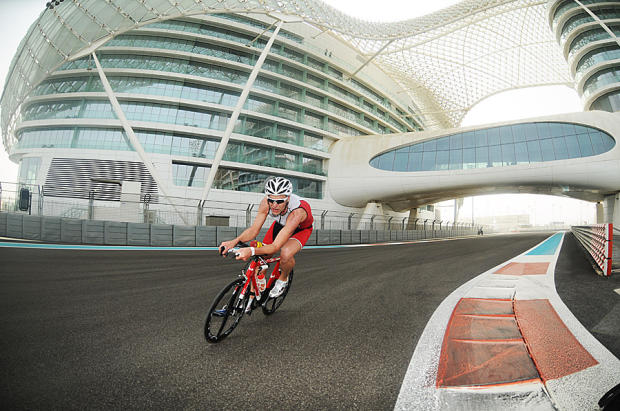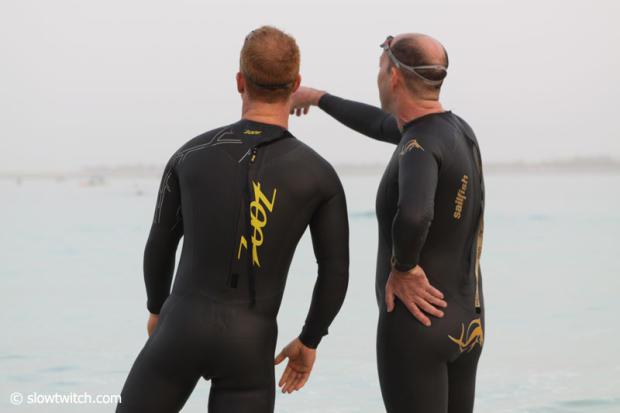One Athlete’s Midnight Express
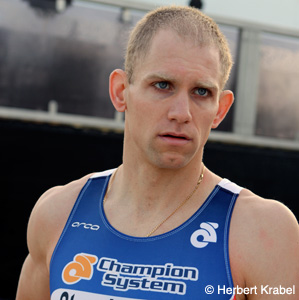
Andrew Starykowicz sat in an Abu Dhabi jail sharing stories with his Arab cellmates. A beefcake Palestinian in a muscle shirt was caught driving without a license. He'd passed the driving test, but the license had not arrived—those without cultural standing in the United Arab Emirates (UAE) do tend to face more bureaucracy. His impatience warranted a night in jail.
What landed Starykowicz there was more serious. The charges included reckless driving and—more troublesome—attempted manslaughter. He would later be found guilty of four charges in a trial that, by his reckoning, took 15 minutes. What follows is Starykowicz' recounting, which is contradicted by race producer IMG. We'll note when the accounts diverge.
On the 3rd of March, 24 hours before swapping stories with cellmates, Starykowicz was in the lead in the Abu Dhabi Triathlon. This race is one of a number of high profile sporting events that take place in the United Arab Emirates (UAE), which include a major Grand Prix motor race.
Starykowicz had finished the swim leg, shot to the lead during the cycling segment, and was well in front of a class field that included a number of world champions.
The cycling leg alone in this swim-bike-run race is 120 miles long. This race's duration, weather and location require a lot of on-board refueling, accomplished via "aid stations" at which competitors take on food and water bottles. One such station was worked by volunteers from the nearby British School Al Khubairat. (Two years ago star distance swimmer Fran Crippen died during a high profile FINA open water swim event in Al Khubairat.)
While riding through this station race leader Starykowicz collided with Carly Williams as she was attempting to hand a bottle to another competitor. The 27-year-old Briton woman—a resident in the UAE and a teacher at the British School—sustained serious head injuries which were life threatening for some weeks after the accident.
The collision brought Starykowicz down, resulting in a broken collarbone and associated injuries. After making sure Williams was in the hands of first responders, he rejoined the race, and continued until the end of the bike segment, retiring prior to the run leg as a result of his injuries.
A day later a warrant was issued for his arrest. He would land in jail, the fruit of an additional charge: leaving the scene of an accident.
Another of his cellmates—this one an Emerati national—told Starykowicz his story. While drunk, outside of a mosque, he beat an Indian national, sending him to a hospital. He wasn't in jail for the beating, rather for showing up to a mosque intoxicated.
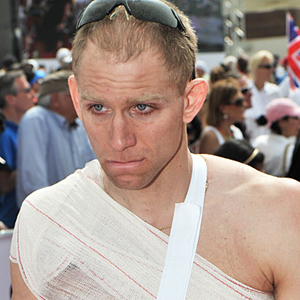
Notwithstanding Starykowicz' predicament, all athletes acknowledge that hospitality and athlete treatment while at the Abu Dhabi Triathlon is impeccable—if nothing goes awry. The race is owned by the Abu Dhabi Tourism & Culture Authority (ADTCA). It contracts the production of the race to IMG, a large and highly regarded global producer of events. IMG also produces high profile golf and tennis tournaments in Abu Dhabi.
IMG has offices on every habitable continent. It's blended its mass participation endurance properties into a global umbrella called Challenger World, and under this banner sit the Escape From Alcatraz Triathlon, the London Triathlon, and the recently announced Beijing International Triathlon.
The IMG office enjoying escalating success is the one in London. Challenger World is its brainchild. Its Virgin Active London Triathlon is a 13,000-person race, arguably the world's largest. The London office is the contractor for the triathlon in Abu Dhabi.
Starykowicz spent only one night in jail. However, his passport was seized and he was forbidden to leave the country. He spent the next six weeks wading through Abu Dhabi's infamous bureaucracy; appearing before the prosecutor assigned to his case; attending his trial; and waiting for the disposition of his fate.
Another of Starykowicz' cellmates during his night in jail was also a visitor to Abu Dhabi: an ad executive from Egypt, dressed to the nines in a Versace suit and Prada shoes. Earlier that evening he was in his car sitting at a traffic light when he was rear-ended by a local sheik. The well-dressed man was taken to jail because—as it was explained to him—had he not been in the country, there would have been no accident.
This might seem like The Twilight Zone, but, only to outsiders. Not to Emeratis. What all Starykowicz' cellmates had in common is what they do not have: wasta. This is roughly translated as juice, or pull, or standing, and accrues to an individual based on his place in his tribe, and his tribe's place in Emerati society.
In casting about to get my arms around what wasta means in the United Arab Emirates (UAE), I found this, from a female blogger indigenous to the region:
"There are two types of people in Bahrain, those with wasta and those without. If you don't have a wasta for passport renewals, driving tests, phone numbers, registration plates, getting a job, getting promoted, getting a loan for a house, getting a piece of land in certain areas, getting into a good school, getting government contracts, getting past ministerial bureaucracies of any shape or form, getting university scholarships for certain courses, getting sent abroad for medical treatment, being seen by a particular doctor, get priority on free healthcare—u get the picture—then your life can be hell as u face wall after wall. If u have a wasta, you can get ur passport renewed in one day. If you don't and u go through "normal" procedures, i.e., waste three weeks of your time back and forth to the Ministry of Immigration, making sure every bit of paper is signed as you ricochet between lazy official[s] who keep losing your papers and telling you to go back to "GO" like a game of monopoly…"
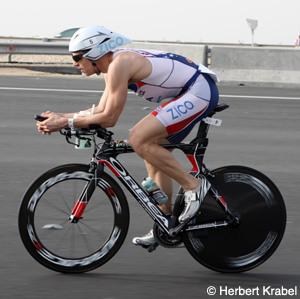
Starykowicz received a lot of support stateside, including from Lance Armstrong. While the cycling star has been fighting his own battles with government and quasi-government agencies, he was in constant email contact with the Starykowicz camp during the entire ordeal in the UAE. Armstrong worked his state department connections and personally appealed, in a phone call, to Abu Dhabi's ambassador to the U.S.
To what degree Armstrong's attempts helped finally get Starykowicz out of Abu Dhabi is not known. The U.S. Embassy in Abu Dhabi will not comment, citing U.S. the Privacy Act of 1974, which prevents the embassy from disclosing information on Starykowicz' case. According to Starykowicz' girlfriend, Armstrong was in contact with her almost daily during the ordeal. Armstrong's contacts were at a high level, according to Starykowicz camp, and his work was indefatigable.
Starykowicz eventually made it out of the UAE after a 6-week house arrest. His main contact—and his prime adversary—was a prosecutor that only allowed him to leave after the posting of what the prosecutor termed a "blood money bond." This is in addition to a fine for his crimes, in the single-digit thousands, which, Starykowicz thankfully acknowledges, IMG paid on his behalf.
The blood money bond is called a diyya, and the price is set by law at 200,000 dirhams, which is about US$54,400. This is the price the government attaches to the life of a person who is killed as a result of an accidental death. This is what Starykowicz had to pay in order to leave Abu Dhabi, and Ms. Williams family would receive the diyya in case of her death.
Starykowicz was x-rayed in Abu Dhabi, and told that he did not suffer any serious injury. Upon return to the United States he underwent shoulder surgery—his humerus that penetrated his labrum—and during the surgery a stitch patched together a torn bicep. He was also apprised that he'd separated his shoulder and broken his clavicle. His racing season is over due to the accident, however he hopes to resume some training near the end of July.
As to the bond, Starykowicz is now legally qualified to retrieve it, since Ms. Williams is recovering. The event owners and IMG told him his best play was to return to Abu Dhabi to receive his bond in person, a process which should take, according to a race spokesman, "a couple of days."
Starykowicz is reticent to do that. Asked whether IMG or the race owner (the Abu Dhabi Tourism and Culture Authority, or ADTCA) will stand good for Starykowicz' bond if it is not returned to him, IMG demurred. Rather than answering the question directly, it forwarded a response from the ADTCA, saying, "If Andrew follows the required procedures, there should be no issue in retrieving the bond." It added that, "He is currently following the required procedures."
IMG also told Slowtwitch that, "The event continues to provide all relevant legal counsel where required and when requested," and "A local lawyer has been brought on for Andrew to be fully dedicated to the timely retrieval of his bond."
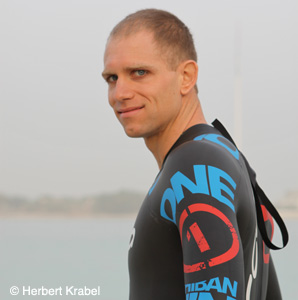
This does not square with the email IMG sent directly to Starykowicz. IMG's attorney in the Middle East handling Starykowicz' case wrote him striking a different posture, in an email dated June 6th:
"Due to other commitments, Sultan [a representative of the ADTCA, which owns the Abu Dhabi Triathlon] is unable to assist with this matter anymore and unfortunately, I am not in a position to drop all my other work in order to sort this out for you… The Prosecutor clearly stated that the best option is for you to come and collect the money but if you insist in proceeding by POA [power of attorney] and are not satisfied with my attempts to help you, then I would recommend that you hire an attorney who will be able to deal with this matter in your time frame."
This is not the only inconsistency between Starykowicz' account and that of IMG. IMG maintains that Starykowicz "was not officially charged." Starykowicz not only lists his charges with specificity, but credits IMG for paying his fine when he was convicted.
IMG will not say whether it will reimburse Starykowicz if, after he exhausts his remedies, the bond he paid to leave the country is not returned.
[Editor: An earlier version of this story characterized the blogger quoted as "indigenous to the UAE." This was factually incorrect, and that phrase now reads, "indigenous to the region."]


